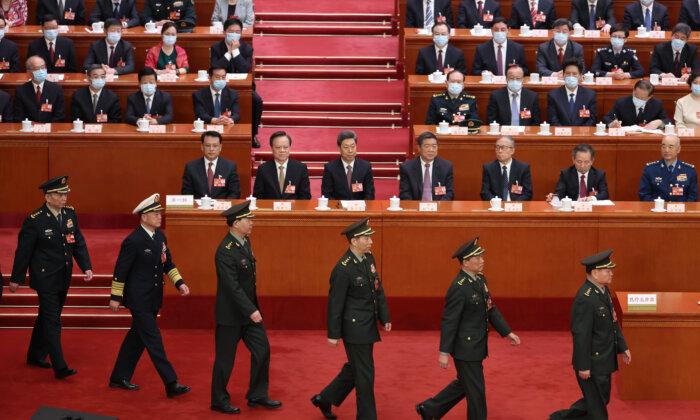Commentary
With its restructuring of the People’s Liberation Army (PLA), the Chinese Communist Party (CCP) aims to advance its position against the United States in the arena of information warfare.
Last year witnessed significant maneuvers by the CCP, marked by the dismissal of several high-profile officials. Notable figures such as Defense Minister Li Shangfu and Wei Fenghe, a former defense minister and head of the Rocket Force, were removed from their positions. In December alone, nine top officials, many linked to procurement and the Rocket Force, faced expulsion.
This year, the PLA is embarking on a reorganization drive to enhance its combat effectiveness, presenting heightened risks for the United States, Taiwan, and other nations targeted by the CCP.
One of the most significant developments this year involves the dissolution of the Strategic Support Force (SSF). Established during military reforms in 2015, the SSF amalgamated the PLA’s capabilities in space, cyber, electronic, and psychological warfare. The SSF will now give way to the Information Support Force (ISF). As described by Chinese state media Global Times, the “PLA Information Support Force [is] significant in promoting [the] high-quality development of [the] Chinese military and winning modern warfare.”
The ISF’s enhanced duties encompass network-centric warfare, electronic warfare, information operations, and space and counter-space operations. According to PLA spokesperson Wu Qian, the establishment of the ISF is “of profound and far-reaching significance to the modernization of national defense and the armed forces and effective fulfillment of the missions and tasks of the People’s military in the new era.”
As a new strategic component of the PLA, the ISF aligns with the CCP’s objective to expand China’s military prowess beyond its terrestrial and maritime domains, enabling the capacity to engage in warfare in distant territories, across oceans, and even in space. This military restructuring coincides with a downturn in the Chinese economy and the CCP’s challenges in extending its influence internationally.
According to CCP leader Xi Jinping, the ISF serves as a “key support in coordinating the construction and utilization of the cyber information system.” Recently, cyberattacks perpetrated by Chinese entities have been on the rise, with the FBI issuing warnings about potential attacks on critical infrastructure. FBI Director Wray has stated that the CCP views every facet of U.S. society, economy, and military as targets. He further warned that the CCP could disable civilian infrastructure in such attacks to sow panic and “break America’s will to resist.”
The ISF operates under the leadership of Lieutenant General Bi Yi, formerly the deputy commander of the PLA Ground Force and the SSF. General Li Wei, who previously served as the Political Commissar of the SSF, holds the same role within the ISF. Support Force General Ju Qiansheng was noticeably absent from the ISF’s commissioning ceremony at the Central Military Commission and is reportedly under investigation for corruption.
Cao Weidong, a retired senior researcher at the PLA Naval Research Academy, informed reporters at the West Pacific Naval Symposium in Qingdao that the restructuring will facilitate “better deployment“ of satellite systems, expanding warfare into cyberspace, and enhancing electronic warfare capabilities. Furthermore, there will be an improved adjustment to the ”informatization” conditions of modern warfare, a key goal outlined in Xi’s PLA modernization plans.
A report published by Air University (AU) has concluded that the CCP regards informatization as crucial for success in warfare. This conclusion finds support in Xi’s statement on the ISF, which emphasizes that “in modern warfare, victory hinges on information. The struggle is between systems, and whoever commands information superiority holds the initiative in war.”
Following the changes implemented in the PLA last year and those this year, the PLA currently consists of four branches—Ground Force, Navy, Air Force, and Rocket Force—alongside four arms: aerospace force, cyberspace force, information support force, and joint logistic support force. A report presented at the CCP’s 20th National Congress emphasized the significance of network information systems and coordination among the PLA branches. The ISF will play a pivotal role in this regard, overseeing the coordination of the PLA’s network information systems, thereby enhancing the effectiveness of the PLA as a military force.
The game is far from over, though. According to AU researchers, the establishment of the ISF is a component of the PLA’s endeavor to adopt and employ the U.S. military’s approach to information. While the PLA strives to emulate the Americans, it has not yet achieved parity. The United States maintains an “edge in information age warfare that the PLA aspires to.” AU further suggests that the United States and its allies must continually refine and integrate information warfare across their combined forces to uphold this advantage.
Maintaining an advantage in information warfare demands ongoing technological advancement, an arena in which the Chinese regime is rapidly gaining ground. The Department of Defense has emphasized that continuous investment will be essential for the United States to uphold its superiority. While the establishment of the Information Support Force doesn’t entirely bridge the information warfare gap between the PLA and the U.S. military, it is indeed narrowing it.
Views expressed in this article are opinions of the author and do not necessarily reflect the views of The Epoch Times.







